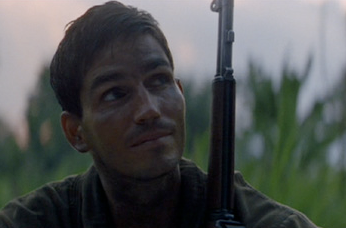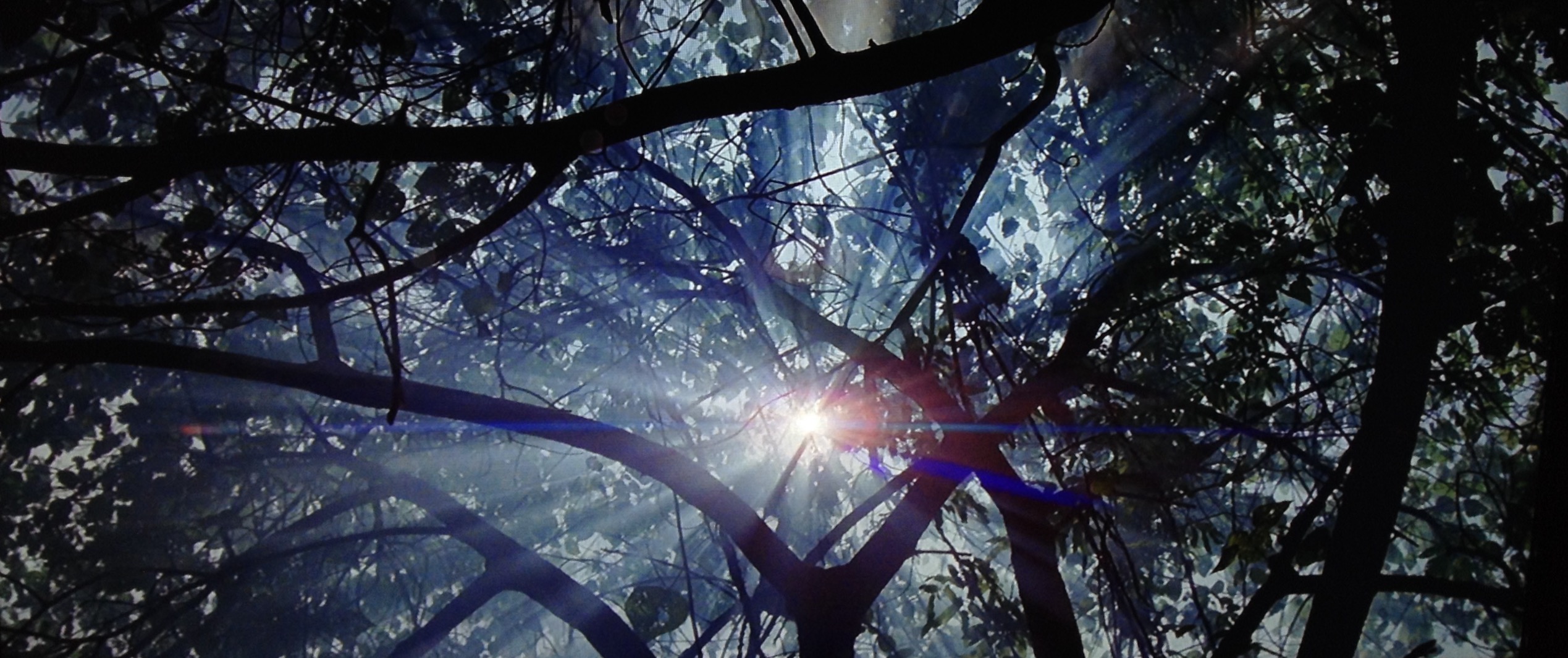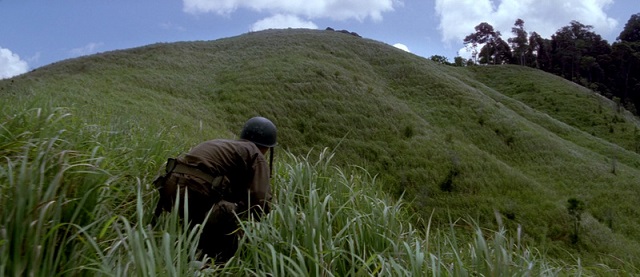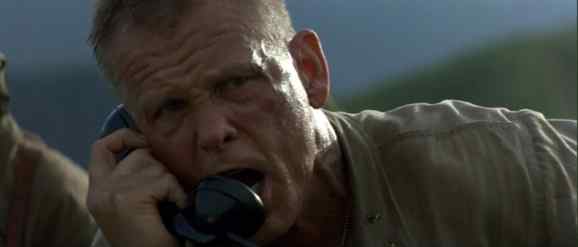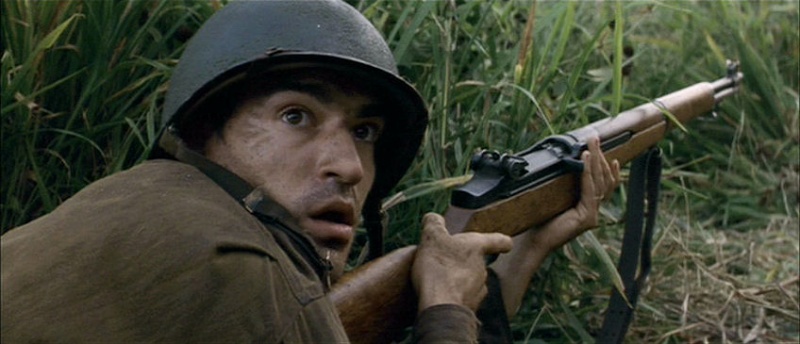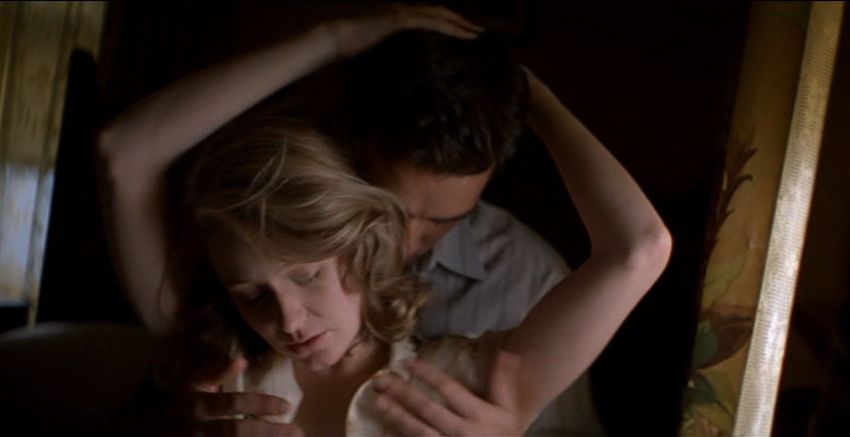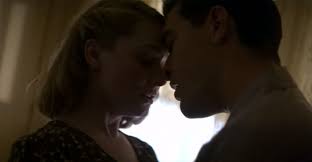|
home | what's new | other sites | contact | about |
||
|
Word Gems exploring self-realization, sacred personhood, and full humanity
Marti and Jack
Wikipedia: The Thin Red Line is a 1998 American epic war film written and directed by Terrence Malick. Based on the novel by James Jones, it tells a fictionalized version of the Battle of Mount Austen, which was part of the Guadalcanal Campaign in the Pacific Theater of World War II. It portrays soldiers of C Company, 1st Battalion, 27th Infantry Regiment, 25th Infantry Division, played by Sean Penn, Jim Caviezel, Nick Nolte, Elias Koteas and Ben Chaplin. The film's title comes from the novel, which was named referencing a line from Rudyard Kipling's poem "Tommy", from Barrack-Room Ballads, in which he calls foot soldiers "the thin red line of heroes", referring to the stand of the 93rd Regiment in the Battle of Balaclava of the Crimean War. The film marked Malick's return to filmmaking after a 20-year absence... Principal photography took place in the Australian state of Queensland and in the Solomon Islands. The film grossed $98 million against its $52 million budget. Critical response was generally positive, and the film was nominated for seven Academy Awards: Best Picture, Best Director, Best Screenplay Based on Material Previously Produced or Published, Best Cinematography, Best Film Editing, Best Original Dramatic Score and Best Sound. It won the Golden Bear at the 1999 Berlin International Film Festival. Martin Scorsese ranked it as his second-favorite film of the 1990s. On At the Movies, Gene Siskel called it "the greatest contemporary war film I've seen". Plot United States Army Private Witt goes AWOL from his unit and lives among the carefree Melanesian natives in the South Pacific. He is found and imprisoned on a troop carrier by First Sergeant Welsh of his company. The men of C Company, 1st Battalion, 27th Infantry Regiment, 25th Infantry Division have been brought to Guadalcanal as reinforcements in the campaign to secure Henderson Field and seize the island from the Japanese. As they wait in a Navy transport, they contemplate their lives and the invasion. Battalion commander Lieutenant Colonel Tall talks with Brigadier General Quintard about the invasion and its importance. C Company lands on Guadalcanal unopposed and marches to the interior of the island, encountering natives and evidence of the Japanese presence. They arrive near Hill 210, a key Japanese position. The Japanese have placed bunkers at the top of the hill and anyone attempting the climb will be cut down. A brief shelling of the hill begins the next day at dawn. C Company attempts to capture the hill but is repelled by gunfire. Among the first killed is one of the platoon leaders, Second Lieutenant Whyte. During the battle, a squad led by Sergeant Keck hides behind a knoll safe from enemy fire to wait for reinforcements. Keck reaches for a grenade but accidentally pulls the pin and is killed by the resultant blast. Lieutenant Colonel Tall orders the company commander, Captain James Staros, to take the bunker by frontal assault, at whatever cost. Staros refuses and Tall decides to join Staros on the front line to see the situation. The Japanese resistance seems to have lessened, and Tall's opinion of Staros seems to have been sealed. Private Witt, having been assigned punitively as a stretcher bearer, asks to rejoin the company, and is allowed to do so... Critical Reviews Owen Gleiberman gave the film a "B-" in his review for Entertainment Weekly and wrote, "The Thin Red Line could, I think, turn out to be this season's Beloved, a movie too paralyzingly high-minded to connect with audiences." In his review for Time, Richard Corliss wrote, "Some films deal in plot truth; this one expresses emotional truth, the heart's search for saving wisdom, in some of the most luscious imagery since Malick's last film, the 1978 Days of Heaven". Mike Clark of USA Today gave the film four out of four stars. Writing in the Washington Post, Michael O'Sullivan wrote, "The Thin Red Line is a movie about creation growing out of destruction, about love where you'd least expect to find it and about angels – especially the fallen kind – who just happen to be men."
Kairissi. Private Witt had gone AWOL but not because he was afraid. He was just too conflicted. He was patriotic in his own way, and wanted to help all peoples. He would eventually give his life for his friends.
"Who are you who live in all these many forms? You’re death that captures all. You, too, are the source of all that’s gonna be born. You’re glory. Mercy. Peace. Truth. You give calm a spirit. Understanding. Courage. The contented heart."
Elenchus. He'd had a mystical experience, had caught a glimpse of the afterlife, and now saw beauty and meaning everywhere and in everything. The film-director captures Witt's preoccupation with the transcendental by occasionally focusing on a scene in nature...
as to highlight, by way of stark anomaly, the horror of war. K. Those anomalies were not just of the bullets-and-bombs sort. A very disturbing aspect of the Guadalcanal story was Colonel Tall's insistence that a machine-gun fortified hill be taken by frontal assault, even though, as recommended by his junior officer, the knoll might be more safely taken, with minimal casualties, at nightfall...
But Tall, caring nothing for the assured loss of human life, wanted an immediate blood-and-guts attack.
His motives were disgusting. His primary concern was making a name for himself, a big splash. He'd been waiting for a glorious war, his big chance for high promotion, and he wasn't going to let a little thing like unnecessary GI-carnage stand in his way for a spot in the pantheon. E. As Herman Melville would say, he was destined for high elevation -- but only at the gallows. And, in the midst of all this mayhem, we find a certain soldier, a Private Jack Bell, who is missing the girl he loves.
K. Isn't it telling? The world might be going to hell all around you, the stench of death at your right hand, with the darkness of Hades at your left -- but what really bothers you is feeling so alone and empty with your beloved far away. E. It's a particular brand of death and hell, and the worst sort. K. We've talked about this. It's the "secret garden" of intimacy, a personal universe made just for two. E. During his days of combat, as did Frankl, he would mentally escape his nightmare-world via visions of their lost love...
He reminded himself of how close they were before the war; that during their four years together, he'd never spent one night apart from her. He comforted himself with thoughts such as these:
Love. Where does it come from? Who lit this flame in us? No war can put it out, conquer it. I was a prisoner. You set me free. We. We together. One being. Flow together like water. Till I can't tell you from me. I drink you. Now. Now. Why should I be afraid to die? I belong to you. If I go first, I'll wait for you there, on the other side of the dark waters. Be with me now. My dear... I get something twisted out of my insides by all this blood, filth, and noise. I want to stay changeless for you. I want to come back to you the man I was before.
K. (softly) There is a tenseness in your voice now, Elenchus. E. I think the most horrific scene in the entire movie was not that of men marching into the maw of death -- as this was done courageously and with valor. But the worst was Prvt. Bell receiving a letter from Marti back home... she said she was too lonely to wait for him and was going to marry an Air Force pilot... K. (silence) E. There's an unforgettable scene in the movie... he's just received the terrible letter... and now he's ambling about the camp; sort of stumbling aimlessly... disoriented... looking this way and that... not knowing what to do... or whether to go on living. Her betrayal... in terms of timing, in the way it was done, for lack of just cause... was unforgiveable. K. (very softly) You are angry, Elenchus... E. (silence)
Kairissi: (softly) I know this is a hot-button topic for you. You don't need to say anything more. Elenchus. (sighing) K. But, as footnote, I would just like to add a final word. Some people think that girls are "made of sugar and spice and everything nice," but boys just want to chase any two-legged form with a skirt. Girls are good and decent, they say, but boys can't be trusted to do the right thing because they can't keep their pants up. This is very one-sided, and very wrong. E. (silence) K. Base and raw callings of Mother Nature, of mammalian impulse, work in both unenlightened male and female. We know what his problem is, and it's famous, but hers is more subtle and just as problematic and devious. And if she's not "present" to her motivations, she will betray sacred trust just as any fevered male. A nurturing Mary is hard-wired to pursue home-and-hearth, those babies and Christmas mornings for tots -- and if she is not very careful, and very honest, she will betray herself and her true love, along with her authentic and deepest feelings, destiny and "constructive assent," in favor of some short-term and evanescent mirage of familial happiness.
|
||
|
|


